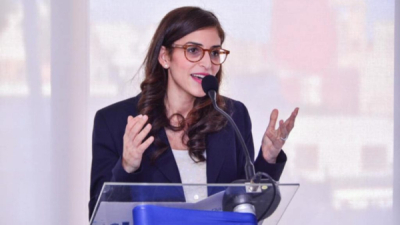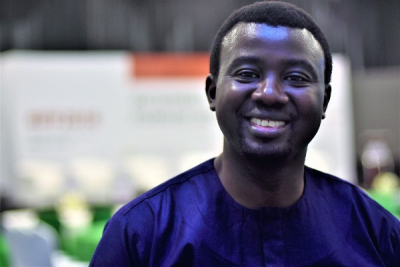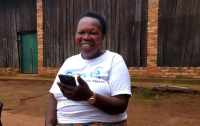Nigeria is considered the African country hosting the highest number of scammers. However, sometimes the scammers tarnishing its image are based abroad. Hence, to extend their capacity to effectively deal with the issue, national authorities bet on international cooperation.
Nigeria recently took a major step forward in its fight against cybercrime. The country officially joined the list of the 66 countries that signed the Budapest Convention on Cybercrime, National Security Adviser (NSA) Babagana Monguno announced on August 24.
According to his statement, the convention is signed weeks after President Muhammadu Buhari authorized it (on July 6), following the approval of the Federal Executive Council (FEC) on June 29.
Nigeria is actively engaged in the fight against cybercrimes. In 2015, it passed the Cybercrime Act providing an “ effective, unified and comprehensive legal, regulatory and institutional framework for the prohibition, prevention, detection, prosecution and punishment of cybercrimes in Nigeria.”
Six years later, the federal government elaborated the National Cyber Security Policy and Strategy (NCPS 2021) and established the Nigerian Computer Emergency Response Team (ngCERT) and the National Digital Forensics Laboratory.
Thanks to the Budapest Convention, it will "support and be part of international cooperation in addressing the menace of cybercrime. This is considering the cross-border nature of cybersecurity threats and the dire need for synergy as well as effective collaboration with the international community to tackle the ever-increasing challenge,” indicated Babagana Monguno.
The Budapest Convention, also known as the Convention on Cybercrime, is the first international treaty to combat Internet crime by harmonizing national laws, improving investigative techniques, and enhancing cooperation among nations.
Samira Njoya
With the boom of the digital economy, new professional activities have surfaced, bringing new legal, tax, and ethical challenges. The legal framework being planned by Algeria aims to prevent possible abuses in the country’s digital economy.
Yacine El Mahdi Oualid (photo), Algeria’s Minister of Knowledge Economy and Startups, recently provided more information on the entrepreneurship law being elaborated by his Ministry. On August 18, 2022, he took to his Facebook page, explaining that the law would not govern liberal professions, already regulated activities, or artisans. It will regulate new economic activities that emerged in the wake of the digital economy, he explained.
The economic activities included in its scope are namely web influencing, e-marketing, app and web development, information design, etc.
According to the government official, the law (which will soon be submitted to parliament) will introduce numerous incentives like online registration, streamlined accounting, preferential tax regimes, and social security coverage. It will also allow the professionals covered to open business bank accounts and register their home address or co-working spaces as their domiciled address.
The draft project of the said law was approved during a ministerial council on July 13, 2022. It aims to prevent possible abuses by web entrepreneurs. Indeed, on August 9, 2021, Algerian courts sentenced four web entrepreneurs to 6-month imprisonment for scam and criminal association in the case dubbed Future Gate, involving a fictitious agency that claimed to offer technical support to students who wish to go to school in foreign universities.
The new law will encourage digital entrepreneurship, and help the youth employ themselves, therefore reducing the unemployed population. It will also facilitate the exportation of Moroccan digital services and contribute to the national economy, Yacine El Mahdi Oualid added.
Muriel Edjo
In Africa, biometrics adoption is rising steadily. A growing number of countries are getting interested in biometric technologies because of their effectiveness to combat fraud.
The Togolese National Social Security Fund (CNSS) recently launched Biosecu, a facial recognition web application to attest that its beneficiaries (pensioners and annuitants) are well alive at specified dates.
With Biosecu, the CNSS wants to allow its beneficiaries to perform those mandatory checks remotely. That way, they will no longer be obliged to reach out to dedicated CNSS agencies.
"Facial recognition allows us to confirm that your face perfectly matches the biometric information held by CNSS Togo," explains the social security institution.
In recent years, the country has introduced several reforms including the payment of social benefits in the beneficiaries’ bank accounts. There was also a reform to check whether the beneficiaries (both within and outside the national territory) were alive as of a set date. This operation carried out bi-annually was aimed at preventing fraud.
According to a statement by CNSS director general Ingrid Awadé, the operation, which was previously suspended, in compliance with Covid-19 barrier measures, has resumed and will run from August 16 to December 31, 2022, for pensions and annuities to be paid during the first half of 2022.
"As of January 1, 2023, payment will be suspended for beneficiaries who have not performed the check, per the social security code,” she stressed.
In Togo, the CNSS is the pioneer of digitalization. It was the first to launch dematerialization with online form-filling and payment. With its facial recognition platform, it is innovating once again by leveraging technology to allow its beneficiaries to easily carry out its mandatory processes but at the same time combatting fraud.
Fiacre E. Kakpo
In 2014, she decided to relocate to Morocco and contribute to the development of her native country. The choice has proven judicious since the healthtech solution she introduced won her national and international awards.
Zineb Drissi Kaitouni (photo) is a Moroccan entrepreneur and trained financial analyst. In 2014, she co-founded healthtech DabaDoc with Driss Drissi Kaitouni to facilitate access to healthcare and improve the management of medical appointments. Her startup has close to eight million users in several African countries. They use DabaDoc platforms to set appointments with over 10,000 health professionals specialized in more than 100 medical specialties.
DabaDoc was “initially developed to help health professionals manage their agenda and digitize patient pathways. It now helps digitalize patients’ records and offers a reliable and secure video consultation platform to doctors who have adopted this cutting-edge tool,” Zineb told Moroccan media La Nouvelle Tribune in March 2022.
The tech entrepreneur started her professional career, in 2003, as an analyst for Goldman Sachs. In 2012, she co-founded Ruby’s in London, before relocating to Morocco, in 2014, to contribute to the development of her native country.
She chose the health sector when she found out how challenging it was for the population to access healthcare because of factors like unavailable assistants, and poor appointment management leading to crowded offices. She decided to address those challenges with technology.
Her choice proved to be a good bet because, thanks to DabaDoc, Zineb has received several national and international awards. She for instance won the first prize in the Global Innovation for Science and Technology in 2014. She also won third prize in the SeedStars World competition the same year.
In 2015, Aspen-Blackstone selected DabaDoc as one of the top 10 startups in the MENA (the Middle East and North Africa) region. Four years later, Zineb was nominated as a Technology Pioneer by the World Economic Forum and even won the Endeavor Entrepreneur award.
In April 2021, Orange Middle East and Africa entered DabaDoc’s capital. The operator also introduced its payment services to make DabaDoc’s services more accessible and add new services. Thanks to that partnership, the startup launched its services in Côte d’Ivoire, in June 2022.
Melchior Koba
The coronavirus pandemic triggered a surge in remote work. Companies are now more open to hiring remote talents. Talenteum wants to facilitate the process by allowing access to a remote African talent pool.
Talenteum is a digital solution developed by Mauritian organizational development firm Talenteum Group. The solution allows companies to hire their workforce from a remote African talent pool. It also allows African professionals to join its talent pool to seek employment.
The platform boasts an active community of African professionals, from accountants to project managers. By subscribing to its monthly or yearly membership, companies can access that pool and launch recruitments. To launch those processes, companies have to fill out dedicated forms giving relevant details on the skills desired. Once those steps are completed, Talenteum takes over by posting relevant job ads, gathering resumes, and carrying out initial interviews.
In 2019, Talenteum made it to MyAfricanStartup.com's annual list of the 100 African startups worthy of investment. The following year, it was one of the finalists of the World Summit for Migration and Development, enabling its founders to present the solution during the Migration Challenge led by the International Organisation of Employers (IOE) and Seedstars.
Adoni Conrad Quenum
The appointment is the culmination of an extensive experience in the digital sector and several fellowships.
On August 16, 2022, Nigerian social entrepreneur Gbenga Sesan (photo) was selected among the ten members of the inaugural leadership panel to steer the Internet Governance Forum (IGF) up to 2023.
Reacting to his selection among the inaugural team, Gbenga “welcomed the appointment saying he was honored and looking forward to serving the world alongside the high-level leaders and also influence digital policy globally,” informs a release by Paradigm Initiative - which the Nigerian entrepreneur serves as an executive director.
The Nigerian social entrepreneur was selected following “an open call for nominations,” we learn. This experience will add to the skills he acquired working, between 2008 and 2012, as a member of the UN Committee of e-Leaders for ICT and Youth. During his time as a member of that committee, he “Worked with selected young experts from various regions of the world to discuss youth input in the global ICT space” while still assuming his normal duties as the executive director of Paradigm Initiative.
In Nigeria, Gbenga served as a member of two presidential committees. They are namely the Presidential committees on Harmonization of Information Technology, Telecommunications and Broadcasting Sectors (2006) and Roadmap for the Achievement of Accelerated Universal Broadband Infrastructure and Services Provision (2013).
From 2020 to 2021, he has been a non-resident scholar at Standford University’s Digital Civil Society Lab. He also received several fellowships including the Cyber Stewards Fellow, Crans Montana Forum Fellow, and Archbishop Desmond Tutu Leadership Fellow.
All those fellowships and nominations are the culmination of an extensive experience in the IT sector. He started his professional journey in 2001 with the Nigerian branch of Junior Achievement Worldwide, a global network dedicated to empowering students in financial literacy, work readiness, entrepreneurship, and digital literacy. During his time with Junior Achievement Nigeria, he led the Lagos Digital Village, a joint project with several partners including Microsoft and the Lagos Business School. In the early days of the coronavirus pandemic, he advised the World Health Organization on data privacy. He is currently advising the World Economic Forum on its Trust Operationalization Project to develop a rights-based data policy for businesses.
Melchior Koba
The funds will help build customer loyalty and boost retention. It will also help launch regional expansion.
Nigerian B2B platform Omnibiz announced, Friday (August 19), it completed its pre-series A round, raising US$15 million. The platform will use those funds to accelerate its growth, win customer loyalty and retention for more revenue.
The round, led by Timon Capital, had Ventures Platform, LoftyInc Capital Management, Chapel Hill Denham, Chandaria Capital, and Musha Ventures as participating investors. It consisted of US$5 million as equity participation and US$10 million as debt investment.
“We believe the smart informal retailer – not shopping malls - is the future of modern retail in Africa. By providing the capital, tools and logistics, we will enable retailers to offer great merchandising at an affordable price point to win their customers’ trust. This funding will allow us to quadruple the profitability of our retailers, build a scalable and profitable business, and take us one step closer to transforming African retail,” said Omnibiz co-founder and CEO, Deepankar Rustagi.
According to Techcrunch, Omnibiz will use the funding to double down on winning the loyalty of its retail customers and drive client retention.
Meanwhile, Disrupt Africa explains that by “employing its holistic strategy to become the primary B2B operating system for retailers – helping with last mile delivery, procurement, working capital, inventory management and operational tools for tracking sales, cost, prices and profit – Omnibiz projects a 4x revenue increase for its retailers.”
The company will begin its regional expansion this month, we learn.
Omnibiz was founded in June 2019. It allows retailers to place orders and have those orders delivered to their doorsteps free of charge. Retailers can place their orders via the company’s mobile apps, by chatting on Whatsapp or by calling a dedicated support number.
To date, the e-commerce platform connects retailers in Nigeria and Ghana to more than 200 brands while the goods are delivered by its network of over 70 logistics partners. More than 3,000 retailers use its platform daily, Omnibiz claims. With the information provided by the platform, retaillers can view inventory in real-time and avoid buying products that may prove difficult to resell.
For Nikos Katsaounis, Timpon Capital Partner, the Fast-moving consumer goods “ supply chain is fragmented, inefficient, and opaque. Omnibiz tackles all of these problems and addresses them with an efficient software layer that provides much-needed data on this otherwise obscure market and supply chain.”
Samira Njoya
During his presidential term, which started in April 2013, the outgoing president Uhuru Kenyatta, initiated a set of projects transforming Kenya into a tech powerhouse. His successor plans to build on his achievements to make the country a digital transformation reference.
On August 15, William Ruto was declared the winner of the last presidential election in Kenya, one of Africa’s leading tech powerhouses. In his manifesto, the incoming president promised to implement projects aimed at accelerating the digital transformation initiated by outgoing president Uhuru Kenyatta.
One of his plans is to add 100,000 kilometers of optic fiber cable to the existing 9,000 km network in the next five years. The aim is to achieve universal broadband availability during the period. He also wants to increase the rate of public services digitization and automated critical government processes to 80 percent.
According to the manifesto, broadband and digital transformation will “play a critical role in enabling [Kenya] to make tremendous achievement in the other four pillars of Health, Agriculture, MSME and Financing as well in enhancing revenue collection via automation of VAT systems.”
In recognition of the digital sector’s impact on job creation and poverty alleviation, William Ruto also announced his plan to reduce internet costs to facilitate access to internet for Kenyan youth, therefore giving them the possibility to learn, get crucial information and do business.
He also promised to establish an “Africa Regional Hub” and promote “the development of software for export.” Similarly, the incoming president plans to develop the business process outsourcing (BPO) industry into a major export and job creation sector.
“The administration will strengthen Konza Technopolis to bring together industry, academic institutions and other innovators to co-invest in emerging technologies to create high-quality jobs that leverage on artificial intelligence, robotics and other technologies and thus enhance our regional and global competitiveness,” the manifesto reads.
The projects are aimed at making Kenya a digital transformation reference on the African continent by 2027 and guaranteeing effective human, economic and social development. The investments required to carry out those projects are estimated at Ksh40 billion (US$334 million), to be financed by the Universal Service Fund. The fund, managed by the Communications Authority (CA), is made up of taxes levied on licensees, government appropriations, grants, and donations.
Muriel Edjo
In Africa, rural areas are usually shunned by banks. Therefore, residents of those areas have to rely on alternative solutions. With Save, Rwandan startup Exuus wants to make those alternative solutions more efficient.
Save is a fintech solution developed by Rwandan startup Exuus. It allows individuals to “save collectively” for financial empowerment.
The solution was developed to facilitate an already existing process. “The lack of financial access for poor and vulnerable populations limits their access to a range of services and opportunities and, therefore, exacerbates their vulnerability to, in turn, end up in cycles of poverty. [...] To break this cycle, for decades now, low-income people both in urban and rural areas create savings groups. The savings circulates among members through different ways and return to members in credit or savings with interest giving them access to affordable capital to grow their small businesses and become financially resilient,” explained Exuus founder, Steve Shema.
Save makes the collective savings and loaning process smoother and more efficient. Thanks to its mobile app (available for Android and iOS devices), web platform, and USSD code, the solution empowers members of each saving group. After paying dues, members can apply for loans to start or expand their businesses.
The solution also helps members who belong to many saving groups to monitor their savings and pay their contributions without paying any transaction fee. In 2019, Exuus revealed that based on the feedback received for its fintech solution, it was planning to establish a presence in other East African countries. However, it said it was “tapping into a market of US$64 million in Rwanda and more than US$2 billion in annualized savings in East Africa.” At the time, the startup had already raised some US$575,000 for its operations.
Adoni Conrad Quenum
Despite the ongoing crises and long-standing structural issues, the African startup ecosystem is still thriving. However, it is not yet up to par with the ecosystems in other continents, Europe, and North America namely. The initiative is aimed at helping reach its full potential.
UNDP Africa launched, Wednesday (August 17), timXLAGOS, the Nigerian chapter of Timbuktoo, an initiative aimed at investing US$1 billion of private and public funds to “spur the startup revolution across Africa.”
According to a UNDP release, the aim of Timbuktoo is to “get a lot of private and public sector partners to help set up eight Timbuktoo Hubs in places that are known to have strong startup ecosystems, such as Accra, Nairobi, Cape Town, Lagos, Dakar, Kigali, Casablanca, and Cairo.”
Timbuktoo was initiated in 2021, to contribute to UNDP Africa’s mission to transform the continent by leveraging its population, “especially its ambitious and dynamic youth.” Through the US$1 billion initiative, UNDP plans to help some 1,000 African startups grow significantly over the coming decade.
“The Timbuktoo approach will be based on finding, nurturing, and building African solutions put forward by Africa's youth that directly address one or more of the 17 Sustainable Development Goals (SDGs),” UNDP Africa indicates.
To achieve that goal, the initiative will facilitate the construction of eight private-sector-driven Timbuktoo hubs across Africa. Each of them will focus on a key area -fintech, agritech, Healthtech, Greentech, Creatives, Tradetech and Logistics, Smart Cities and Mobility, or Tourismtech- and host a venture builder and a venture fund.
According to the UNDP release, “Timbuktoo has made significant progress since its inception.” It launched the development of University Innovation Pods (UniPods) in ten “lower-income countries” namely Benin, Chad, Guinea Conakry, Lesotho, Malawi, Mali, Rwanda, Sierra Leone, South Sudan, Togo, and Uganda. The universities will encourage innovation and design thinking. That way, they will prompt the development of strong startup ecosystems in those countries, making them worthy to host Timbuktoo hubs. They are expected to become operational by end-2022, we learn.
For Eleni Gabre-Madhin, UNDP Africa Chief Innovation Officer, “Timbuktoo is a big, innovative, and unique initiative to overcome the present vacuum in early-stage risk capital, to better integrate African innovation stakeholders from universities to corporates to investors, and to enable startups to embrace the African market opportunity.”
Samira Njoya
More...
In recent years, Tunisia has placed a particular emphasis on digitization. The aim is to streamline administrative procedures and facilitate access to digital services by 2025.
In Tunisia, citizens can now order and receive birth certificates online. On August 16, 2022, a joint decree from the Ministries of Interior, Justice, and ICT consecrated the effective launch of the project, which was announced months earlier.
According to the decree, the birth certificate will now be issued online, in compliance with the applicable laws governing the protection of sensitive documents. “The document is issued online through the civil registry’s online platform,” the decree indicates. It adds that the document will be issued for free during a 6-month pilot phase, through the digital platform www.e-bawaba.tn.
The new project ends the cumbersome administrative procedures citizens had to complete to obtain their birth certificates. Also, with a fully digitized issuance system, the processing time will be reduced.
This is the second digital reform being implemented in Tunisia in about two months. On July 1, the country launched Mobile ID, a mobile identity project aimed at linking phone numbers to ID cards and generating personal QR codes for citizens.
The two projects are part of the national strategy to facilitate citizens' access to public services and reduce processing times.
Samira Njoya
The bureau is part of the US fintech company’s African expansion strategy. It will serve as a base for the extension of Visa Inc.’s footprint in Central Africa.
Electronic payment solutions provider Visa Inc. recently opened a bureau in the Democratic Republic of Congo (DRC), its first in Central Africa. The bureau was inaugurated during an official visit of a Visa Inc. delegation led by its CEO, Alfred Kelly.
On Wednesday, August 10, in Kinshasa, the delegation met with Congolese Prime Minister Jean-Michel Sama Lukonde to discuss digitalization projects. During the audience, Alfred Kelly explained that the DRC bureau is urgently needed because the country is one of the most dynamic in Africa. Visa is “pleased to establish a local presence (there). Our shared goal is to expand access to e-commerce and support the DRC economy by working closely with public and private partners,” he said.
Through its local bureau, Visa will partner with public and private actors and decentralize access to digital services for the population by introducing new solutions. It will also create solutions facilitating payment collection.
During one of his previous visits to the DRC, Alfred Kelly inked partnerships with the country's central bank, financial institutions, fintech companies, merchants, and mobile operators. In the coming months, Visa will issue unique identifiers for more than 150,000 M-PESA clients in the DRC. It will also assist fintech company Infoset in a project to boost financial inclusion.
The DRC bureau is the eighth inaugurated by Visa Inc. in Africa. The seven others are in South Africa, Côte d'Ivoire, Morocco, Rwanda, Kenya, and Nigeria. In 2016, when it inaugurated its bureau in Côte d'Ivoire, Visa justified it with its ambition to capitalize on the growth potential of the French-speaking African market and also get closer to its clients, who are involved in the development of digital payment solutions.
Samira Njoya
Corporate environmental responsibility has become a global trend in recent years. In its framework, businesses take actions to reduce their negative impacts on the environment. Taaply wants to assist in that process by introducing smart cards.
Taaply is a digital app developed by Cameroonian startup Taaply Inc. It helps read the contact information embedded in the QR codes of the smart cards issued by the Cameroonian startup.
By launching its smart cards, Taaply Inc (founded in 2020) aims to offer green solutions that will end paper use in the business information-sharing process. “Africa has a high rate of carbon emissions, with few methods on reducing its carbon footprint [...]. I believe Africa will benefit tremendously from digitizing business cards, thus reducing their carbon footprint and helping the environment,” says Taaply Inc. cofounder Lekel Asonganyi
Its business card reader is available for Android and iOS devices. It allows paying customers to update their business and personal information.
Taaply Inc. offers three types of cards. The first is the “Social Card”, which costs US$29.95. It is for “social enthusiasts such as students, bloggers, and non-business owners.” The second type of card is the “Pro Card (which costs US$39.95), dedicated to “ small business owners and entrepreneurs.” The last one is the “Corp Card” (US$64.95), which is the “perfect” solution for enterprises. It can be customized with “company logo, color, design and more.”
In 2021, Taaply Inc revealed that it had over 400 paying customers, with plans to expand into other African countries, namely Chad, Togo, Nigeria, and Kenya.
Adoni Conrad Quenum
The round is announced just months after the last fundraising operation concluded by the fintech company. Its proceeds will help the company expand further and develop new products and services.
Ghanaian fintech startup Zeepay announced, Friday (August 5), the completion of a Series A round, raising US$10 million. The funds were raised from Netherlands-based Symbiotics BV (US$9 million), with participation from a Mauritius-based fund (US$1 million). They will enable the startup to expand into selected African markets and boost its offers.
In its release announcing the round, Zeepay quoted its founder and managing director Andrew Takyi-Appiah, saying that the “raise was necessary and comes at the time when we are planning to increase our annual turnover from USD 1.5 billion circa 2021 to USD 200 billion over the next 5 years.”
Zeepay was founded in 2016. It provides digital solutions to facilitate online transactions. Currently, it claims over 130,000 transactions facilitated monthly. In March 2020, it became the first Ghanaian company to receive an Electronic Money Issuer (EMI) license from the central bank BoG. The startup is already operational in 20 African countries. But, it wants to increase its continental footprint and “augment support from local African Banks the likes of Ecobank, Fidelity Bank and Absa” as its CFO Godfried Boakye puts it.
Samira Njoya















